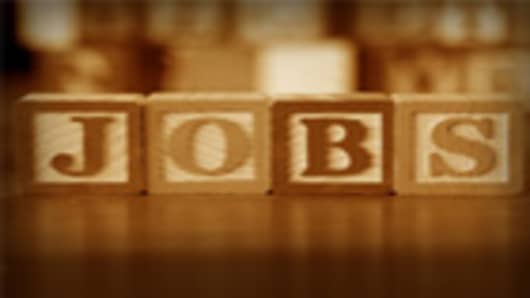The early news out of the corporate earnings season is that some companies see enough improvement in the economy to begin hiring again.
It's a trickle, but it's a start and it's across a variety of industries. Tech bellwether Intel Tuesday said it was adding 1,000 to 2,000 workers — its first hiring plan in five years — and it will speed up the roll out of two factories. JPMorgan Chase said it was adding 9,000 employees, and CSX, the rail company, said it was bringing back furloughed workers to its ranks.
Only a handful of major companies have reported so far this earnings period; Intel , JPMorgan and CSX all beat expectations and gave relatively bullish forecasts.
"It's about time. They've been making money for awhile and they've been very reluctant to hire. We know they've stopped firing, and they're seeing the light at the end of the tunnel," said Mesirow Financial chief economist Diane Swonk.
Of course, not all industries will see improvements that encourage hiring. Southwest Airlines Chief Executive Gary Kelly told CNBC today that the company is still reducing its work force through attrition and has no plan to add jobs in 2010.
"Companies have already dipped their toe into transitory, non-committal hiring, like temporary workers and consultants. It makes sense they want to bring back some talent before everyone else gets a hold of them," said Swonk.
JPMorgan is hiring across the board and plans to bring in bankers, lenders and even branch workers. The consumer-focused businesses will see the bulk of the hiring. JPMorgan has been adding workers in its continuing businesses, and did so last year, despite an overall workforce reduction due to its acquisition of Washington Mutual .
Deutsche Bank chief economist Joseph LaVorgna said while he acknowledges he's been overly optimistic of late on hiring, he believes the recent data shows a shift, including March retail sales. Retail sales rose 1.6 percent, better than the 1.2 percent forecast.
"Quarterly, we're up 5.5 percent in retail sales year-over-year. It's the strongest since the first quarter of 2006," said LaVorgna. "If you look at the trends in retail sales and what they imply in payrolls, because both series tend to move together, there's going to be further catch-up in employment."
The government's March employment report showed the first signs of job creation since the recovery began. The report, released April 1, showed an increase of 162,000 non-farm payrolls in March, and an unemployment rate of 9.7 percent.
Swonk still does not believe that unemployment rate will come down much soon. "We still had a pretty marginal employment report in the month of March. We need jobs. I don't think we're going to see a rapid reduction in the unemployment rate, and I'd love to be wrong. We overshot during the recession, and we're seeing some stabilization with employment," she said.
While a small sample, the anecdotally positive news from big companies contrasts with a more dire outlook from the world of small business, which is responsible for most of the hiring typically. The National Federation of Independent Business released its survey Tuesday, showing that business owners are glum on the economy and are not in a hurry to expand or hire. The survey in fact declined 1.2 points in March to 86.8.
"You have 8.5 million jobs that were lost, we're assuming this year you're going to be getting 2 million jobs back this year," LaVorgna said. "You don't need everyone to say they're hiring...you just need some to start the process."
Weekly jobless claims data, which will be reported Thursday, will be important to markets, especially since last week's data showed a surprising increase in unemployment claims.
Questions? Comments? Email us at marketinsider@cnbc.com



